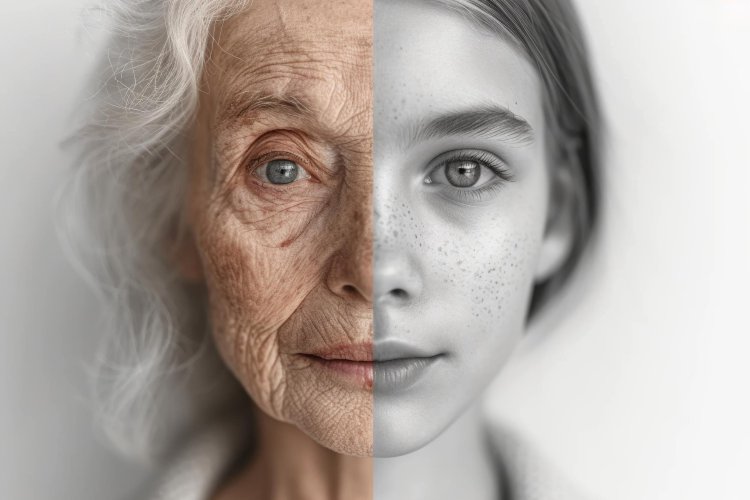Youthful Skin Secrets: How to Slow Down the Aging Process
Skin aging is a multifaceted process influenced by intrinsic (internal) and extrinsic (external) factors. While aging is an inevitable part of life, understanding the mechanisms behind skin aging and implementing preventative strategies can help maintain a youthful appearance for longer. This article delves into the reasons why skin ages and provides comprehensive strategies to prevent premature skin aging.

Why Does Skin Age?
Intrinsic Aging
Intrinsic aging, also known as chronological aging, is the natural aging process that occurs with the passage of time. This process is largely determined by genetics and typically begins in the mid-20s. Key aspects of intrinsic aging include:
- Reduction in Collagen Production: Collagen is a crucial protein that provides structural support to the skin. As we age, collagen production declines, resulting in thinner, less resilient skin.
- Decreased Elastin: Elastin fibers allow the skin to stretch and snap back. Over time, these fibers degrade, leading to a loss of skin elasticity and the formation of wrinkles.
- Slower Cellular Turnover: The rate at which skin cells renew themselves decreases with age, causing a buildup of dead skin cells that leads to a dull complexion and slower healing of the skin.
Extrinsic Aging
Extrinsic aging is influenced by external factors and environmental exposures. The primary contributors to extrinsic aging are:
- Sun Exposure: Ultraviolet (UV) radiation from the sun is the most significant factor in extrinsic aging, a process known as photoaging. UV rays damage the DNA in skin cells, leading to wrinkles, loss of skin elasticity, pigmentation changes, and an increased risk of skin cancer.
- Pollution: Environmental pollutants generate free radicals that damage skin cells, accelerating the aging process. This can result in a loss of skin tone, elasticity, and firmness.
- Lifestyle Choices: Smoking, poor diet, lack of sleep, and excessive alcohol consumption contribute significantly to premature skin aging. These habits can cause oxidative stress and inflammation, leading to skin damage.
How to Prevent Skin Aging
Preventing skin aging involves a multifaceted approach that includes protective measures, a consistent skincare routine, and healthy lifestyle choices. Here are detailed strategies to help prevent premature skin aging:
Sun Protection
- Sunscreen: Apply broad-spectrum sunscreen with an SPF of at least 30 every day, regardless of weather conditions. Reapply every two hours when outdoors or after swimming or sweating.
- Protective Clothing: Wear wide-brimmed hats, sunglasses with UV protection, and long-sleeved shirts to minimize direct sun exposure.
- Shade: Seek shade whenever possible, especially during peak sun intensity hours between 10 a.m. and 4 p.m.
Skincare Routine
- Cleansing: Use a gentle cleanser to remove dirt, oil, makeup, and pollutants without stripping the skin of its natural moisture.
- Moisturizing: Hydrate your skin with a suitable moisturizer to maintain the skin barrier and prevent dryness, which can lead to fine lines and wrinkles.
- Antioxidants: Incorporate serums and creams containing antioxidants like vitamin C, vitamin E, and ferulic acid. These ingredients help neutralize free radicals and reduce oxidative stress.
- Retinoids: Products containing retinoids (retinol, tretinoin) can stimulate collagen production, accelerate cell turnover, and improve skin texture and tone.
- Exfoliation: Regular exfoliation with alpha hydroxy acids (AHAs) or beta hydroxy acids (BHAs) can remove dead skin cells and promote a brighter, smoother complexion.
Healthy Lifestyle
- Balanced Diet: Eat a diet rich in fruits, vegetables, lean proteins, and healthy fats. Foods high in antioxidants, such as berries, leafy greens, nuts, and fish, can help protect the skin from oxidative damage.
- Hydration: Drink plenty of water throughout the day to keep your skin hydrated from within.
- Quality Sleep: Aim for 7-9 hours of sleep per night to allow your skin time to repair and regenerate. Poor sleep can accelerate signs of aging like dark circles and fine lines.
- Avoid Smoking and Limit Alcohol: Smoking constricts blood vessels and reduces blood flow to the skin, depriving it of oxygen and nutrients. Alcohol dehydrates the skin and can lead to inflammation and damage over time.
- Regular Exercise: Exercise boosts circulation, delivering oxygen and essential nutrients to the skin. It also helps reduce stress, which can have a positive effect on skin health. Activities like yoga, walking, and strength training can improve overall skin tone and elasticity.
In conclusion, while aging is a natural and unavoidable process, understanding the factors that contribute to skin aging can help you take proactive steps to maintain your skin’s health and appearance. By combining diligent sun protection, a robust skincare regimen, healthy lifestyle choices, and regular physical activity, you can effectively slow down the process of skin aging and enjoy a radiant complexion for years to come.
Disclaimer: The information provided in this article is for educational purposes only and should not be considered medical advice. If you have any health concerns or are experiencing symptoms, it is important to consult with a healthcare professional, such as a doctor or clinic, for proper diagnosis and treatment. Always seek the advice of your doctor or other qualified health provider with any questions you may have regarding a medical condition. Do not disregard professional medical advice or delay in seeking it because of something you have read in this article.
#SkinAging #AntiAging #SkincareRoutine #SunProtection #HealthyLifestyle
What's Your Reaction?





















